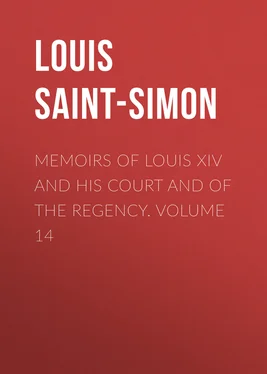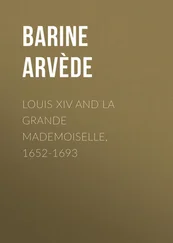Louis Saint-Simon - Memoirs of Louis XIV and His Court and of the Regency. Volume 14
Здесь есть возможность читать онлайн «Louis Saint-Simon - Memoirs of Louis XIV and His Court and of the Regency. Volume 14» — ознакомительный отрывок электронной книги совершенно бесплатно, а после прочтения отрывка купить полную версию. В некоторых случаях можно слушать аудио, скачать через торрент в формате fb2 и присутствует краткое содержание. Жанр: Биографии и Мемуары, История, foreign_edu, foreign_antique, foreign_prose, на английском языке. Описание произведения, (предисловие) а так же отзывы посетителей доступны на портале библиотеки ЛибКат.
- Название:Memoirs of Louis XIV and His Court and of the Regency. Volume 14
- Автор:
- Жанр:
- Год:неизвестен
- ISBN:нет данных
- Рейтинг книги:3 / 5. Голосов: 1
-
Избранное:Добавить в избранное
- Отзывы:
-
Ваша оценка:
- 60
- 1
- 2
- 3
- 4
- 5
Memoirs of Louis XIV and His Court and of the Regency. Volume 14: краткое содержание, описание и аннотация
Предлагаем к чтению аннотацию, описание, краткое содержание или предисловие (зависит от того, что написал сам автор книги «Memoirs of Louis XIV and His Court and of the Regency. Volume 14»). Если вы не нашли необходимую информацию о книге — напишите в комментариях, мы постараемся отыскать её.
Memoirs of Louis XIV and His Court and of the Regency. Volume 14 — читать онлайн ознакомительный отрывок
Ниже представлен текст книги, разбитый по страницам. Система сохранения места последней прочитанной страницы, позволяет с удобством читать онлайн бесплатно книгу «Memoirs of Louis XIV and His Court and of the Regency. Volume 14», без необходимости каждый раз заново искать на чём Вы остановились. Поставьте закладку, и сможете в любой момент перейти на страницу, на которой закончили чтение.
Интервал:
Закладка:
Nevertheless, I did not choose to press him: to announce my embassy, at the same time trying to obtain from him the instructions I was to receive, and which, passing through him and the Regent done, told nothing to the public, as my preparations would have done. But I could not obtain them. Dubois carelessly replied to me, that in one or two conversations the matter would be exhausted. He wished me to know nothing, except vaguely; to leave no time for reflection, for questions, for explanations; and to throw me thus into embarrassments, and to cause me to commit blunders which he intended to make the most of.
At last, tired of so many and such dangerous postponements, I went on Tuesday, the 23rd of September, to M. le Duc d'Orleans, arranging my visit so that it took place when he was in his apartments at the Tuileries; there I spoke with such effect, that he said I had only to show myself to the King. He led me to his Majesty at once, and there and then my embassy was announced. Upon leaving the King's cabinet, M. le Duc d'Orleans made me jump into his coach, which was waiting for him, and took me to the Palais Royal, where we began to speak seriously upon the affairs of my embassy.
I fancy that Cardinal Dubois was much annoyed at what had been done, and that he would have liked to postpone the declaration yet a little longer. But this now was impossible. The next day people were sent to work upon my equipments, the Cardinal showing as much eagerness and impatience respecting them, as he had before shown apathy and indifference. He urged on the workmen; must needs see each livery and each coat as it was finished; increased the magnificence of each; and had all my coats and those of my children sent to him. At last, the hurry to make me set out was so great, that such of the things as were ready he sent on by rapid conveyance to Bayonne, at a cost by no means trifling to me.
The Cardinal next examined the list of persons I intended to have with me, and approved it. To my extreme surprise he said, however, that I must add forty officers of cavalry and infantry, from the regiments of my sons. I cried out against the madness and the expense of such a numerous military accompaniment. I represented that it was not usual for ambassadors, with a peaceful mission, to take with them such an imposing force by way of escort; I showed that these officers, being necessarily gay men, might be led away into indiscreet gallantries, which would give me more trouble than all the business of my embassy. Nothing could be more evident, true, and reasonable than my representations, nothing more useless or worse received.
The Cardinal had resolved to ruin me, and to leave me in Spain with all the embarrassment, business, and annoyances he could. He rightly thought that nothing was more likely to make him succeed than to charge me with forty officers. Not finding them, I took only twenty-nine, and if the Cardinal succeeded as far as concerned my purse, I was so fortunate, and these gentlemen were so discreet, that he succeeded in no other way.
Let me add here, before I give the details of my journey to Spain, in what manner the announcement of these two marriages was received by the King and the public.
His Majesty was by no means gratified when he heard that a wife had been provided for him. At the first mention of marriage he burst out crying. The Regent, M. le Duc, and M. de Frejus, had all the trouble in the world to extract a "yes" from him, and to induce him to attend the Regency Council, in which it was necessary that he should announce his consent to the proposed union, or be present while it was announced for him. The council was held, and the King came to it, his eyes swollen and red, and his look very serious.
Some moments of silence passed, during which M. le Duc d'Orleans threw his eyes over all the company (who appeared deeply expectant), and then fixed them on the King, and asked if he might announce to the council the marriage of his Majesty. The King replied by a dry "yes," and in a rather low tone, but which was heard by the four or five people on each side of him, and the Regent immediately announced the marriage. Then, after taking the opinions of the council, which were for the most part favorable, he turned towards the King with a smiling air, as though inviting him to assume the same, and said, "There, then, Sire, your marriage is approved and passed, and a grand and fortunate matter finished." The council then broke up.
The news of what had taken place immediately ran over all Paris. The Tuileries and the Palais Royal were soon filled with people who came to present themselves before the King to compliment him and the Regent on the conclusion of this grand marriage, and the crowd continued the following days. The King had much difficulty in assuming some little gaiety the first day, but on the morrow he was less sombre, and by degrees he quite recovered himself.
M. le Duc d'Orleans took care not to announce the marriage of his daughter with the Prince of the Asturias at the same time that the other marriage was announced. He declared it, however, the next day, and the news was received with the utmost internal vexation by the cabal opposed to him. Men, women, people of all conditions who belonged to that cabal, lost all countenance. It was a pleasure to me, I admit, to look upon them. They were utterly disconcerted. Nevertheless, after the first few days of overthrow, they regained courage, and set to work in order to break off both the marriages.
CHAPTER CVII
I have already said that Dubois looked most unfavourably upon my embassy to Spain, and that I saw he was determined to do all in his power to throw obstacles in its way. I had fresh proofs of this. First, before my departure: when he gave me my written instructions, he told me that in Spain I must take precedence of everybody during the signing of the King's contract of marriage, and at the chapel, at the two ceremonies of the marriage of the Prince of the Asturias, allowing no one to be before me!
I represented to him that the Pope's nuncio would be present, and that to him the ambassadors of France gave place everywhere, and even the ambassadors of the Emperor also, who, without opposition, preceded those of the King. He replied that that was true, except in special cases like the present, and that his instructions must be obeyed: My surprise was great at so strange an order. I tried to move him by appealing to his pride; asking him how I should manage with a cardinal, if one happened to be present, and with the majordomo-major, who corresponds, but in a very superior degree, with our grand master of France. He flew in a rage, and declared that I must precede the majordomo-major also; that there would be no difficulty in doing so; and that, as to the cardinals, I should find none. I shrugged my shoulders, and begged him to think of the matter. Instead of replying, to me, he said he had forgotten to acquaint me with a most essential particular: it was, that I must take care not to visit anybody until I had been first visited.
I replied that the visiting question had not been forgotten in my instructions, and that those instructions were to the effect that I should act in this respect as the Duc de Saint-Aignan had acted, and that the usage he had followed was to pay the first visit to the Minister of Foreign Affairs, and to the Councillors of State (when there were any), who are the same as are known here under the name of ministers. Thereupon he broke out afresh, prated, talked about the dignity of the King, and did not allow me the opportunity of saying another word. I abridged my visit, therefore, and went away.
However strange might appear to me these verbal orders of such a new kind, I thought it best to speak to the Duc de Saint-Aignan and Amelot on the subject, so as to convince myself of their novelty. Both these ambassadors, as well as those who had preceded them, had visited in an exactly opposite manner; and they thought it extravagant that I should precede the nuncio, no matter where. Amelot told me, moreover, that I should suffer all sorts of annoyances, and succeed in nothing, if I refused the first visit to the Minister of Foreign Affairs; that as for the Councillors of State, they existed only in name, the office having fallen into desuetude; and that I must pay other visits to certain officers he named (three in number), who would be justly offended and piqued if I refused them what every one who had preceded me had rendered them. He added that I had better take good care to do so, unless I wished to remain alone in my house, and have the cold shoulder turned upon me by every principal person of the Court.
Читать дальшеИнтервал:
Закладка:
Похожие книги на «Memoirs of Louis XIV and His Court and of the Regency. Volume 14»
Представляем Вашему вниманию похожие книги на «Memoirs of Louis XIV and His Court and of the Regency. Volume 14» списком для выбора. Мы отобрали схожую по названию и смыслу литературу в надежде предоставить читателям больше вариантов отыскать новые, интересные, ещё непрочитанные произведения.
Обсуждение, отзывы о книге «Memoirs of Louis XIV and His Court and of the Regency. Volume 14» и просто собственные мнения читателей. Оставьте ваши комментарии, напишите, что Вы думаете о произведении, его смысле или главных героях. Укажите что конкретно понравилось, а что нет, и почему Вы так считаете.












